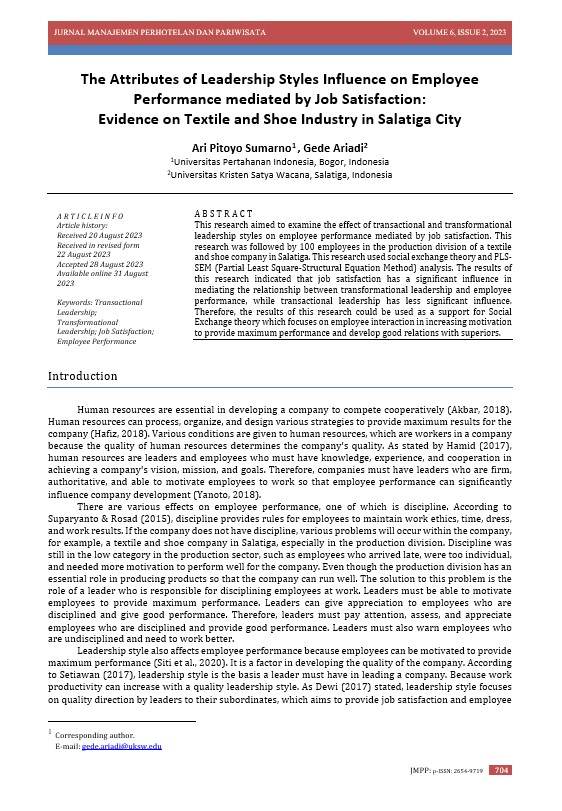The Attributes of Leadership Styles Influence on Employee Performance mediated by Job Satisfaction
Evidence on Textile and Shoe Industry in Salatiga City
DOI:
https://doi.org/10.23887/jmpp.v6i2.67587Kata Kunci:
transactional leadership, job satisfaction, employee performance, transformational leadershipAbstrak
This research aimed to examine the effect of transactional and transformational leadership styles on employee performance mediated by job satisfaction. This research was followed by 100 employees in the production division of a textile and shoe company in Salatiga. This research used social exchange theory and PLS-SEM (Partial Least Square-Structural Equation Method) analysis. The results of this research indicated that job satisfaction has a significant influence in mediating the relationship between transformational leadership and employee performance, while transactional leadership has less significant influence. Therefore, the results of this research could be used as a support for Social Exchange theory which focuses on employee interaction in increasing motivation to provide maximum performance and develop good relations with superiors.
Referensi
Aisyah, S. N. & Wardani, R. (2020). Pengaruh Gaya Kepemimpinan Terhadap Kinerja Karyawan. Bulletin of Management and Business, 1(2), 42–50.
Akbar, S. (2018). Analisa faktor-faktor yang mempengaruhi kerja. Jiaganis, 3(2), 1–17
Ali, S., & Farid, F. (2016). Effect of transformational leadership on job satisfaction and organizational commitment. SSRN Electronic Journal, 2(18), 261–267. https://doi.org/10.2139/ssrn.2713386
Bekti, R. R. (2018). Pengaruh kualitas kehidupan kerja terhadap kepuasan kerja karyawan Rumah Sakit Ibu dan Anak X Surabaya. Jurnal Administrasi Kesehatan Indonesia, 6(2), 156. https://doi.org/10.20473/jaki.v6i2.2018.156-163
Devintasari, F. D. (2017). Pengaruh gaya kepemimpinan transformasional dan transaksional terhadap kinerja karyawan dengan quality of work life sebagai variabel moderasi. Profita Kajian Ilmu Akuntansi, 5(4), 1.
Dewi, S. P. (2012). Pengaruh pengendalian internal dan gaya kepemimpinan terhadap kinerja karyawan SPBU Yogyakarta (Studi kasus pada spbu anak cabang perusahaan RB Group). Nominal, 1(1). https://doi.org/10.21831/nominal.v1i1.993
Hafiz, A. & Ma’mur, M. (2018). Sistem pendukung keputusan pemilihan karyawan terbaik dengan pendekatan weighted product (Studi Kasus: PT. Telkom Cab. Lampung). Jurnal Cendikia, 15(1), 23–28.
Hayati, B., Atefi, Y., & Ahearne, M. (2018). Sales force leadership during strategy implementation: A social network perspective. Journal of the Academy of Marketing Science, 46(4), 612–631. http://dx.doi.org/10.1007/s11747-017-0557-2
Johnathan, H. M. (2017). Studi deskriptif gaya kepemimpinan pada PT. Perusahaan Cat. Agora, 5(9), 1689–1699
Kinerja karyawan. The National Conferences Management and Business (NCMAB), 425–439
Miao, Q., Newman, A., Schwarz, G., & Cooper, B. (2018). How leadership and public service motivation enhance innovative behavior. Public Administration Review, 78(1), 71-81. https://doi.org/10.1111/puar.12839
Nasution, M. I. (2018). Peran kepuasan kerja dan kepemimpinan transformasional terhadap
Pio, R. J., & Lengkong, F. D. J. (2020). The relationship between spiritual leadership to quality of work life and ethical behavior and its implication to increasing the organizational citizenship behavior. Journal of Management Development, 39(3), 293–305. https://doi.org/10.1108/JMD-07-2018-0186
Priyatmo, C. L. (2018). Pengaruh kepemimpinan transformasional terhadap kinerja karyawan dengan mediasi kepuasan kerja. Jurnal Ekonomi, 9(1), 13–21
Ratnamiasih, I. (2014). Pengaruh kepemimpinan transformasional dan transaksional pada kinerja pegawai Bappeda Kota Bandung. Trikonomika, 13(2), 119-126. https://doi.org/10.23969/trikonomika.v13i2.607
Ribeiro, N., Yücel, İ., & Gomes, D. (2018). How transformational leadership predicts employees’ affective commitment and performance. International Journal of Productivity and Performance Management, 67(9), 1901–1917. https://doi.org/10.1108/IJPPM-09-2017-0229
Setiawan, A. (2017). Pengaruh gaya kepemimpinan partisipatif terhadap kinerja karyawan melalui motivasi kerja dan kepuasan kerja. Agora, 5(3), 1–7.
Setyowati, S., & Etikariena, A. (2019). Peran gaya pemecahan masalah dalam hubungan kepemimpinan transformasional dengan perilaku kerja inovatif. Jurnal Diversita, 5(2), 115–125. https://doi.org/10.31289/diversita.v5i2.2857
Sidik, A. R., & Sutoyo, S. (2020). Analisis kepemimpinan transformasional, komitmen dan budaya organisasi terhadap kinerja pegawai PT. Angkasa Pura I (Persero) di masa pandemi covid 19. Jurnal MEBIS (Manajemen Dan Bisnis), 5(1), 69–79. https://doi.org/10.33005/mebis.v5i1.104
Suparyanto & Rosad. (2015). Pengaruh kepuasan kerja, motivasi kerja dan kedisiplinan terhadap kinerja karyawan PT. Garam (Persero), 5(3), 248–253.
Syawal, M. A. (2018). Pengaruh motivasi, kepuasan kerja, dan komitmen organisasional terhadap kinerja karyawan pada CV. Mega Jasa. Teknik Industri, 1(1), 7–11.
Thibaut, J. W. & Kelley, H. H. 1978. Interpersonal relations: A theory of interdependence. John Wiley & Sons
Utami, S. (2015). The influence of customers’ trust on customer loyalty. International Journal of Economics, Commerce, and Management, 3(7), 638–653.
Yanoto, A. (2018). Pengaruh gaya kepemimpinan terhadap kepuasan kerja melalui motivasi dan kinerja karyawan PT. Nutrifood Indonesia di Surabaya. Jurnal Agora, 6(1), 1–10.
Yuen, K. F., Loh, H. S., Zhou, Q., & Wong, Y. D. (2018). Determinants of job satisfaction and performance of seafarers. Transportation Research Part A: Policy and Practice, 110, 1–12. https://doi.org/10.1016/j.tra.2018.02.006










